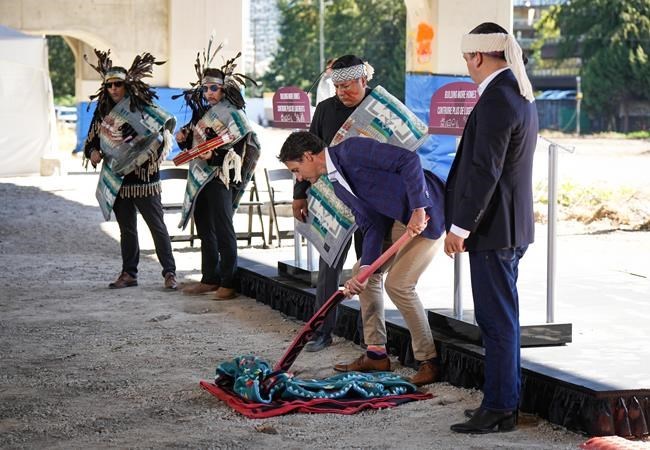VANCOUVER — A massive Vancouver housing development spearheaded by the Squamish Nation has cleared a legal hurdle after a B.C. Supreme Court judge rejected a challenge by a residents' association over lack of consultation.
The Kits Point Residents Association had been seeking to have the Senakw project's services agreement between the First Nation and the City of Vancouver declared unlawful.
The project at the foot of the Burrard Street Bridge leading into Vancouver's downtown core is slated to include 6,000 rental units, and is being funded by $1.4 billion in federal loans.
Prime Minister Justin Trudeau was on the site last year when the project broke ground, and former Vancouver mayor Kennedy Stewart touted the development as "the largest First Nations economic development in Canadian history."
The site is Squamish land that was once expropriated by the Canadian Pacific Railway.
Squamish Nation spokesman Wilson Williams said in an interview Tuesday that the residents' association has been an "antagonist to the development" since it was first announced.
He said the nation was optimistic about the case because it followed a "rigorous process" of due diligence when it was trying to ink the services agreement with the city.
He said he was "comforted and relieved and happy that we can continue to move down this healthy road to developing and building our relationships with not just the City of Vancouver, but the neighbourhoods."
Residents' association director Eve Munro and member Benjamin Peters had filed a court petition in October 2022 seeking to quash the services agreement, claiming in court that the deal was cloaked in "secrecy."
Justice Carla Forth found that the association was indeed "impeded at every step in trying to obtain information about the process and how the services agreement came into existence."
"Their concerns are legitimate in respect to the impact the development will have on traffic congestion, transportation challenges, and many other concerns," says Forth's ruling, dated Friday. "They were provided with no public forum to bring forward their concerns and have them heard."
The judge, however, found that the services agreement and the city council resolution to adopt it were valid, and dismissed the association's petition. The agreement covers things including police and fire services, utilities and public works.
The first phase of construction is set for completion in November 2025, the ruling says.
Munro said in an interview Tuesday that the residents' association's beef was not with the Squamish Nation, but the City of Vancouver's unwillingness to share information about the development.
Munro said the size of the development is "unprecedented," and she thought it necessary to raise issues about how the project will affect "livability" and traffic congestion in the neighbourhood.
She said the association was disappointed the court didn't rule in its favour.
"We felt that there were some important issues that nobody had been prepared to discuss with us and that's how we ended up here," she said. "I think people should be concerned about it and we decided to push back."
City officials repeatedly told the association that the development was not under its jurisdiction, in what Forth's ruling called a "highly unusual situation of a development on land within the geographical boundaries of the municipality, but not within the jurisdiction of the municipality."
The development is on reserve land, and therefore under the jurisdiction of the federal government.
The site was formerly an ancestral Squamish village on the shores of False Creek, the ruling says.
"For generations, the Squamish families would hunt, fish, harvest traditional resources, host potlatches, and trade with neighbouring Musqueam and Tsleil-Waututh peoples," Forth wrote.
But the Squamish people were "induced" to sell the Kitsilano reserve land by the provincial government in 1913, and were illegally removed before their homes were burned down.
The 4.2-hectare site eventually returned to the Squamish Nation after a long court battle, and in 2019 it announced a partnership with property developer Westbank to build thousands of new homes on the lands.
Wilson said the Squamish Nation wants to educate people about the history of the lands, where their ancestors were forced out more than a century ago.
"We've had ceremonies with our people and descendants from the families that have resided there, and it's taken some time, but it's been some good healing in our community as well," he said.
They're open to engaging with the residents' association, Wilson said, but it's a "two-way street." Addressing the city's housing crisis was a way of making Vancouver a "vibrant city again," he added.
"We want to be transparent, we want to be open, we want to be a good people we've always been in welcoming people," he said. "We expect hurdles, we don't expect this to be the last one, but once people start comprehending, understanding, our nation's vision on our lands and being able to accept the history of it, hopefully then they'll be more comforted."
This report by The Canadian Press was first published Oct. 3, 2023.
Darryl Greer, The Canadian Press



